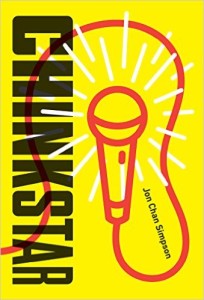Chinkstar
Jon Chan Simpson
Coach House Books, 2015
Review by Clara Kumagai
Run is a Chinese-Scottish seventeen-year-old in Red Deer, Alberta, and he’s not particularly fond of his older brother. They clash, fight, and wrestle, and Run wonders how their Chinese mother and Scottish father produced such different children. This is classical fraternal fare. But Run’s brother is all about the fresh flavour of Asian fusion—and not with rice, but rap: “I’m King Kwong and I’m fuckin here to stay / You ain’t never ever heard this flow— / Black was the night, but Yellow is the day.” (12)
Run’s brother is King Kwong, aka the Great Ape, aka Emperor Yellow Flow, aka Swag Sapien, aka Chink King. (“Ahem,” says a police officer when reciting this last moniker, ‘Chinese-Person’ King.” [37]) Whatever alias he may go by, King Kwong is Red Deer’s god of Asian rap—aka nip-hop, aka chi-rhyme, aka rice-rap, aka chinksta.
Kwong goes missing mere days before his big-break gig in Vancouver, but Run assumes it’s “Car trouble. Ho trouble. Too much shine-mush. Who knows.” (9) But when Kwong doesn’t resurface and Run’s mother is hospitalized after being shot with a golden bullet, Run finds himself in the midst of a gang war between the Apes (Kwong’s disciples) and the Necks. (Short for, yes, rednecks.) And so a chaotic, action-packed thriller begins. Run and his best bro Ali set out to find Kwong amidst brutal rednecks, mutinous Apes, inexplicable feds and a violent love interest.
Ostensibly a hip-hop mystery, with the brawls, getaways and face-offs that come with it, Run’s contemporary story is punctuated by the story of his semi-mythical grandfather (“I shall tell you the tale of your grandfather, A-Gung, Grand Pimp of the East, Celestial Don and Supreme Bawse of Old Cathay…” [58]). As the novel progresses, his journey and Run’s converge; not in place or time, but rather in the search for their own truth. And it’s truth Chinkstar is after. The pace is quick but occasionally uneven, and unlike a classic thriller, there is no aha! moment when all those jagged pieces come together to form a bigger picture. While the final scene is full of imagery and Run’s epiphany of his truth, I was left wanting the answer to the mystery itself.
Simpson’s prose echoes the spit of rap lyrics: fast, clever, deft-tongued and breathless. The opening pages of Chinkstar made me long for an accompanying album, but by its close I realized that it wasn’t necessary; the exuberance and sheer glee in language was its own soundtrack. Even the slang revolves around Asian-ness—faces are blank as the backs of mah-jong tiles, bros are “slants” rather than “homes.” Excerpts of the Tao are translated into the chinksta flow:
A brave and passionate mof will kill or be killed.
A brave and calm mof will always preserve life.
Of these two who is the punkass and who the bawse?
Some things are not favoured by heaven. Fuck knows why.
(109)
Erykah Badu sang that hip-hop is bigger than religion, but it’s true that Simpson’s Chinese-Canadians co-opt the hip-hop culture of African-Americans, and that the line between rewriting and overwriting is hard to balance upon. At times, the dialogue could be a stereotypical depiction of black gangsta style, with Asian references substituted in (in?)appropriate places. It’s important to note the substitutions—there’s no misuse of n-words here. In the opening pages of the novel, King Kwong’s philosophy is laid out plainly:
You know they sayin that it’s a white man’s world and that rap be black music,
but like a fine oolong I be here to infuse it
full of that Asian flavour, I take my Cris with green tea
This ain’t no year of the Ape, it’s a dynasty!
(13)
It’s a bald acknowledgement, but Simpson so thoroughly translates the world through this vernacular that it’s as brash and in-your-face as the rap itself. And Simpson is not unaware of the tension of cultures; it all neatly converges in one of my favourite scenes in the novel, when Run and Ali are skulking about a strip mall and are accosted by two of Kwong’s fanboys, with “dirty blond cornrows and skinnies tucked into jordans.”
“Dude, that’s his brother, no maybe. What up slants? …True
fact: your brother’s like deified. Yellow jesus, f’real.”
“Got them saviour-type beats, man, walk-on-water type flow and all a that.”
“True,” said the other.
“Mad true,” confirmed the one.
(84)
The exchange is elevated to new heights of embarrassment when Ali asks one, “Are you wearing makeup?”
My eyes got wide when I saw what he was pointing at: the baby-banana tint was unmistakable, suddenly contrasting with the bone-white of his neck.
“Yo, slants, man,” said the other, “I said you put too much.”
(86)
Run cracks up at this but it’s an uncomfortable moment; yellowface generally is. These misguided white guys want to appear Asian out of sheer fandom, and while they spectacularly fail, it’s an interestingly reversed scene in a world where white skin is coveted.
Simpson works in these reversals and retellings throughout the novel, creating a place where the Asians are not only powerful but badass, where a fierce language and way of storytelling has been forged. As the retold Tao says, “The chinksta like water will overcome.” (57)
From County Galway, Ireland, Clara Kumagai now lives and writes in Vancouver. Her writing has appeared in Room, Megaphone, Inis Magazine and is forthcoming in EVENT. She is currently a MFA student in the University of British Columbia’s Creative Writing Program, where she is completing a children’s novel. For occasionally interesting tweets, follow @clarakiyoko.